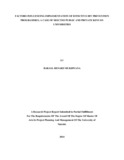| dc.description.abstract | HIV and Aids is a global disease which UNAIDS estimates that there were 33.3 people living
with HIV at the end of 2009 compared with 26.2 million. In sub Saharan Africa, 22.5 million people
are living with HIV while about 1.3 million people died from AIDS related complications in 2010 (
UNAIDS, 2010.Kenya Demographic and Health Survey (KDHS 2008-09) estimated prevalence for
the same population at 6.3 percent. The Kenya Aids Indicator Survey (KAIS 2007) estimated that the
prevalence for HIV in Kenya was at 7.4% in 2007. The findings show that Kenya‘s epidemic has
stabilized in the past few years. Kenyan Universities responded by establishing an Aids Control Unit
at the Commission for University Education. The universities‘ ACUs are coordinated through the
Commission for University Education‘s ACU. The ACUs are mandated to develop programmes
geared towards addressing HIV and Aids prevention, care and support. The ACUs have received a lot
of financial and technical support to implement HIV and Aids programmes. However, Baseline Serobehavioural
study conducted in Six Universities in Kenya (2010) established that there is a limited
human and infrastructural capacity to provide student-friendly programs, shortage of VCT counselors,
weak referral systems and lack of confidentiality. It is as a result of this that the research project
sought to establish factors influencing implementation of HIV programmes in Kenyan Universities.
The objectives of the study were: To determine the influence of leadership capacity of Kenyan
Universities ACU staff on offering HIV prevention programme among selected private and public
Kenyan Universities; to assess the quality of service delivery of Kenyan Universities ACU on
effective HIV prevention programme among selected private and public Kenyan Universities; to
establish the influence of level of supplies management of Kenyan Universities ACU on effective
HIV prevention programme among selected private and public Kenyan Universities; to assess use of
data for decision making in Kenyan Universities ACU on effective HIV prevention programme among
selected private and public Kenyan Universities and ; to determine the influence of human resource
capacity among selected private and public Kenyan Universities. This sample size for this research
was 362 drawn from selected 15 universities (7 from public universities, 8 from private universities).
Primary data was collected using questionnaires, observation, and interviews and secondary data was
collected from reports, books, journals and newspapers. The data collected was analysed using
descriptive statistics and data was presented using frequency tables and percentages. On the positive
note, the research revealed that there is clear leadership, a good supplies management, trusted HIV
prevention data that is used for decision making. On the flip side, ACUs lack of enough and competent
staff, inadequate finances and staff lacking some project management skills, especially monitoring and
evaluation skills. Major study recommendations include development of capacity improvement plans,
increased financial support for ACUs and finally allocate more skilled and experienced human
resource with monitoring and evaluation background | en_US |

